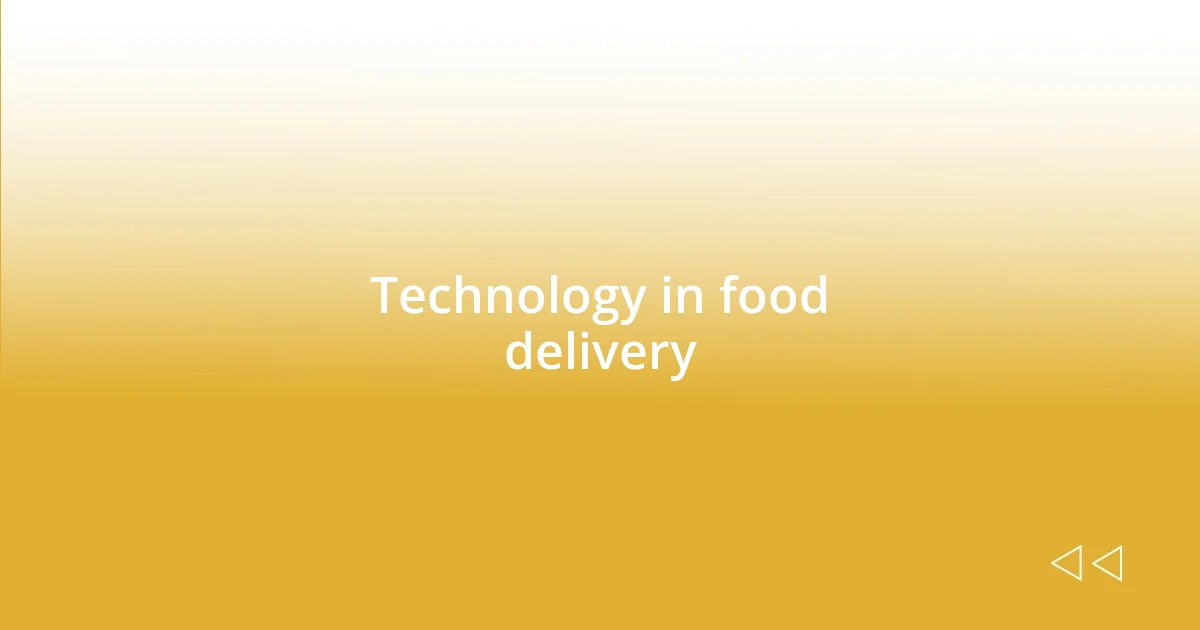Key takeaways:
- Emphasis on convenience through technology, including personalized ordering apps and advancements like drone deliveries.
- Growing focus on sustainability with eco-friendly packaging and responsible sourcing practices, appealing to health-conscious consumers.
- Shift towards engaging marketing strategies that resonate with millennials, such as authentic storytelling and influencer partnerships.

Future trends in fast food
As I look ahead, it’s fascinating to see how technology is shaping the fast food landscape. Just last week, I used a new app that allowed me to order my meal and pay in advance, skipping the usual line. Isn’t it amazing how convenience is becoming a focal point? It feels like I’m living in the future already!
Sustainability is another trend that I find truly exciting. Several chains are now committing to eco-friendly packaging, which makes me feel like my choices can contribute to a healthier planet. I remember the first time I saw a burger wrapped in biodegradable paper and felt a genuine sense of pride—I realized that every little change can make a difference.
Lastly, I can’t help but notice the growing popularity of plant-based options. A friend of mine recently switched to a vegan diet, and we went to a fast food spot that had a mouth-watering plant-based burger. It felt great to enjoy a meal with him, knowing that there are tasty alternatives that cater to different lifestyles. Have you tried them yet? I’m eager to hear how they compare to traditional flavors!

Health-conscious menu innovations
When it comes to health-conscious menu innovations, I’m amazed by how many fast food chains are embracing nutrient-rich ingredients. This shift not only enhances flavor but also adds a new layer of excitement to our dining choices. Just the other day, I tried a quinoa bowl topped with grilled chicken and a zesty avocado dressing. I’ll tell you, it was a satisfying meal that felt good both in my tummy and on my conscience!
Here are some exciting trends I’ve noticed in health-conscious fast food options:
- Low-calorie alternatives: Options like lettuce wraps instead of buns, making meals feel lighter.
- Superfood ingredients: Incorporating ingredients like kale, chia seeds, and spirulina into salads and smoothies.
- Plant-based proteins: Expanding beyond just veggie burgers to choose from lentil tacos and chickpea nuggets.
- Clean label offerings: Menus featuring items with transparent ingredient lists, often free from artificial additives.
- Seasonal produce: Emphasizing fresh fruits and vegetables that are in season for better flavor and nutrient content.
I love discovering new flavors that align with a balanced lifestyle, and it’s exciting to see how fast food is stepping up to the plate!

Technology in food delivery
In the ever-evolving world of food delivery, technology plays a pivotal role in enhancing our dining experiences. I recently discovered a food delivery service that utilizes advanced algorithms to predict my cravings based on past orders. It felt almost uncanny when I received a recommendation for my favorite spicy chicken sandwich just when I was thinking about it! This kind of personalization makes me feel more connected to brands and enhances the overall convenience.
Moreover, the integration of drones and robotics is starting to revolutionize how our meals arrive at the door. When I first heard about a local fast food chain testing drone deliveries, I was both skeptical and excited. Just imagine your burger flying into your backyard! Although it’s still in the early stages, the thrill of such possibilities showcases how technology is pushing boundaries we never thought possible.
Finally, the rise of smart packaging is another fascinating trend. I came across boxes that not only keep food hot but also incorporate QR codes for tracking nutritional information. It reminds me of how I used to struggle with understanding calorie counts—this tech simplifies my choices. With every development, I can’t help but feel that the future of food delivery is not just about convenience, but also about making informed choices effortlessly.
| Technology | Benefits |
|---|---|
| Personalized Ordering Apps | Customized meal suggestions based on individual preferences |
| Drone Deliveries | Faster, more efficient food transportation |
| Smart Packaging | Enhanced tracking of nutritional information for informed choices |

Sustainable sourcing practices
Sustainable sourcing practices are becoming a cornerstone of responsible fast food operations. I remember my visit to a local burger joint that proudly showcased its partnership with local farmers. It was refreshing to hear how they source their beef from grass-fed cattle and use free-range chicken. This not only supports local economies but also allows for a fresher taste, which is a bonus in my book!
As consumers, we have the power to demand change, and I see more chains committing to using sustainable seafood. I once stumbled upon a sushi spot that only served certified sustainable fish. When I learned how overfishing threatens marine ecosystems, it made me appreciate their commitment even more. It’s like a small act of heroism when a fast-food chain prioritizes responsible sourcing. Wouldn’t you agree that enjoying a meal should come with a sense of responsibility?
I’ve also noticed a trend in using plant-based ingredients and alternative proteins, which is both exciting and necessary for our future. One day, while trying a new fast-casual place, I tasted a lentil burger that blew my expectations out of the water! It got me thinking about how urgent it has become to shift away from animal agriculture for environmental reasons. Each delicious bite reminded me that sustainable choices can be both satisfying and beneficial for the planet. Isn’t it amazing how one meal can spark such important conversations?

Impact of plant-based options
The impact of plant-based options in fast food has truly opened my eyes to new flavors and health benefits. I still recall the first time I tried a plant-based burger at a trendy joint downtown. I was amazed at how satisfying it was—so much so that I didn’t even miss the meat! This shift towards plant-based meals not only caters to a growing demographic of health-conscious diners but also helps reduce our carbon footprint. Isn’t it refreshing to see fast food chains embracing sustainability while still delivering taste?
I’ve also noticed that when restaurants feature plant-based choices, they’re not just appealing to vegans and vegetarians but to a broader audience eager to explore. Just last week, my friends and I decided to check out a new place that had a whole section dedicated to plant-based dishes on the menu. Everyone was buzzing with excitement, and to my surprise, even my meat-loving buddy couldn’t get enough of the smoky jackfruit tacos! This speaks volumes about how plant-based options can break down barriers and redefine our eating habits.
Moreover, the push for plant-based options has sparked a much-needed conversation around food choices. I often find myself contemplating the environmental impacts of our diets—especially after trying a delicious dairy-free milkshake that had me questioning why I hadn’t made the switch sooner. It challenges us to think: can we enjoy our favorite fast foods while making choices that are kinder to our planet? I believe the answer is a resounding yes, and it excites me to think where this movement could take us next.

Customer experience enhancements
Fast food has evolved into an experience that goes beyond just a meal. I recall walking into a popular chain and being instantly greeted by an enthusiastic staff member who offered personalized recommendations. That little touch made me feel valued, and I’ve noticed that these unique interactions are becoming more common. Isn’t it interesting how a simple greeting or tailored suggestion can turn an ordinary visit into something memorable?
Additionally, the integration of technology into the fast-food experience is something I find fascinating. Recently, I used a restaurant’s app to place my order while I was still at home. When I arrived, my meal was ready and waiting, hot and fresh. This sort of convenience not only saves time but also enhances customer satisfaction. It makes me wonder—aren’t we all looking for ways to make our lives just a little bit easier in our fast-paced world?
I’ve also been impressed by the recent trend toward creating inviting dining atmospheres. I remember having lunch at a fast-casual spot that invested in cozy seating and vibrant décor, making it feel more like a community space than just another restaurant. As I sipped my smoothie, surrounded by laughter and warm lighting, I thought about how creating a welcoming ambiance can significantly enhance the dining experience. Shouldn’t every fast-food visit feel enjoyable and comforting, allowing us to foster connections with friends and family? It’s this kind of thoughtful design that will truly transform how we perceive fast food in the future.

Marketing strategies for millennials
Marketing to millennials requires a unique and engaging approach, reflecting our values and preferences. I remember scrolling through social media, and it struck me how brands that share authentic stories resonate more with my generation. When a fast-food chain highlights their sourcing practices and supports local farmers, I can’t help but feel an emotional connection—a brand that truly cares about the community makes me eager to support them.
Another strategy that stands out is the use of influencer partnerships. I used to follow a food blogger who showcased delicious fast-food meals with stunning visuals. Seeing my peers excitedly share their meals online made me curious and often led me to try those very places. What I’ve learned from this is that when brands engage micro-influencers who genuinely love their food, it creates a sense of trust and community among their audience.
Lastly, the emphasis on sustainability in marketing truly resonates with me. For instance, I recently came across a campaign that highlighted a restaurant’s commitment to eco-friendly packaging. It made me proud to support a brand that aligned with my values. When fast-food chains actively promote their environmental efforts, it sparks a conversation I love being part of. Isn’t it inspiring when companies take a stand on issues that matter? This alignment helps shape brand loyalty, ensuring that my generation continues to advocate for those who are making positive changes.















